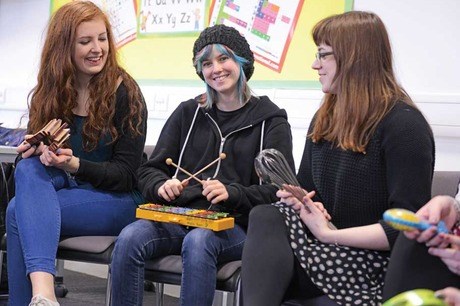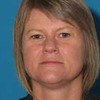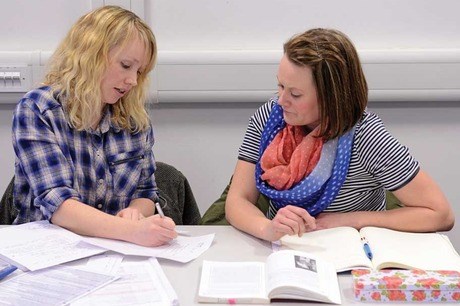Guide to Early Years Teacher Status: Moving 'up a notch'
Gabriella Jozwiak
Monday, March 10, 2014
Although in its early stages, Early Years Teacher Status is fuelling optimism within the sector. Gabriella Jozwiak takes a closer look

Expressions of interest to study for the new Early Years Teacher Status (EYTS) are already healthy, according to those training providers gearing up to offer the programme in September. Meanwhile, the eight providers who are already delivering it report positive student feedback and optimism that the status will offer more career potential than its predecessor, Early Years Professional Status.
The new Early Years Teachers will be trained to deliver the Early Years Foundation Stage for children from birth to age five, although they will understand how early education links to education beyond age five and into Key Stages 1 and 2.
Their role is to be graduate leaders, responsible for organising and leading high-quality teaching practice in early years settings, with a view to making a lasting, positive difference to children's well-being, learning and development. Early Years Teacher Status will be seen as equivalent to Qualified Teacher Status (QTS), although it will not have QTS itself. This means that those with EYTS will not be automatically accredited to work in state-maintained settings or achieve QTS pay scales.
To study for EYTS, trainees will need the same entry requirements as trainee primary school teachers, including a GCSE grade C in English, maths and science or equivalent, and will have to pass the same skills tests. Completion of an early years initial teacher training course will then lead to the award of EYTS.
Early Years Teachers will have to demonstrate that they meet the Teachers' Standards (Early Years), published by the National College for Teaching and Leadership (NCTL) last year, which differ from but operate in parallel with, the current Teachers' Standards.
Only accredited Initial Teacher Training (ITT) providers are able to offer the programme. The NCTL has awarded places at 41 institutions for September, including eight centres that began offering an EYTS programme last autumn.
From September, EYTS will be achievable through four pathways set by NCTL (see box), which differ from the former Early Years Professional routes.

A NEW PHASE
The University of Northampton is upbeat about programme's potential and currently has about 100 students studying for it. In September, the university will have 80 places available across three pathways.
The University of Northampton's head of early years, Eunice Lumsden, believes that EYTS confers a unique skills set. 'It is the only professional qualification covering the early years that has standards relating to safeguarding young children and working with others,' she says.
'Social work standards, for example, are more generic. The inclusion of "teacher" in the title must be understood in the widest sense and the profession itself must take the lead in supporting employers and families to understand their professional role.'
At Canterbury Christ Church University, programme director Denise Reardon believes the approach will take the professionalisation of early years teaching 'up a notch'. 'Most of the providers delivering the programme have been involved with this professionalisation right the way through, so they understand early years really well - this represents the next phase,' she says.
 The University of Chichester is also among the eight providers currently offering the course. While EYTS programme co-ordinator Nikki Fairchild says students are being assessed according to the new standards, the university will be aligning with the new pathways in September 2014.
The University of Chichester is also among the eight providers currently offering the course. While EYTS programme co-ordinator Nikki Fairchild says students are being assessed according to the new standards, the university will be aligning with the new pathways in September 2014.
Next year, Chichester will accept ten people on to the Graduate Entry Mainstream (GEM) course, 20 on to the Graduate Entry Employment-Based (GEB) stream, and five on an assessment-only course for graduates.
'It's a lower number compared to the 50 we have currently, but NCTL has capped places nationally to ensure a good spread throughout the country,' says Ms Fairchild.
A key change Ms Fairchild highlights is an increase in the number of placement days on the GEM course, from a minimum of 100 to 120 days. It also includes a two-week placement in a Key Stage 1 setting.
'It's a really positive thing,' she says. 'It's important that when you go into the sector, you have that strong practice base to back yourself up.'
Each trainee will be supported by a work-based mentor, who will help students meet standards.

MATHS AND SCIENCE REQUIRED
Manchester Metropolitan University also currently teaches EYTS. It will offer 30 places on each of three pathways next year - omitting the assessment-only route. Project director Alexandra Melrose says the higher minimum entry requirements were 'problematic' for some applicants in summer 2013.
'A lot of the students who come to this are already practitioners working in settings,' she says. 'Some of them have a degree, but don't have GCSE maths and science.' She stresses that all applicants must reach all the minimum requirements to apply, and pass the same skills tests as trainee primary school teachers.
A national network of Pearson Professional Centres delivers the skills tests, and trainees have three chances to pass an online literacy and numeracy test before they begin their studies. A candidate who fails three attempts must wait two years before they can try again.
FUNDING INCENTIVE
 Anglia Ruskin University will offer 70 places next year on all four routes. Project manager Catherine Bowler says the university has already received more than 100 expressions of interest. She expects trainees from right across the eastern region - reflecting the quality of the course and the fact that funding is available on both GEM and GEB routes.
Anglia Ruskin University will offer 70 places next year on all four routes. Project manager Catherine Bowler says the university has already received more than 100 expressions of interest. She expects trainees from right across the eastern region - reflecting the quality of the course and the fact that funding is available on both GEM and GEB routes.
The Government will cover the £7,000 graduate entry student course fees, as well as offering bursaries for those with high-class degrees.
A £14,000 funding package is also being made available as an incentive to employers. This money is to be split between the training provider and the employer, and will cover course fees as well as what the employer needs to support the student. This arrangement is designed to encourage employers and training providers to work together proactively.
Ms Bowler says a feature of the course at Anglia Ruskin will be specialist training days. 'We do underpinning knowledge days - specific days for different elements, such as a baby or leadership day,' she says.
 Kingston University will also progress to the new pathways next year, offering both GEM and GEB. Senior lecturer Yasmin Mukadam says the institution is currently finalising course content and design.
Kingston University will also progress to the new pathways next year, offering both GEM and GEB. Senior lecturer Yasmin Mukadam says the institution is currently finalising course content and design.
'The programmes will include teaching sessions at postgraduate level across a number of areas, including relational pedagogy, transitions and safeguarding, along with practice experience across the birth-to-five age range, self study, blended learning and project work,' she says. 'Engagement with Key Stage 1 experience will be an addition this year, building links with our established PGCE early years programme and supporting schools.'
SHARING BEST PRACTICE
 Partnership working is an important factor for many of the institutions offering the course next year. Bishop Grosseteste University will offer 50 places in total on all four routes. It is preparing by establishing partnerships with more than 500 partner schools and early years settings, as well as its local authority and birth to five service. Academic co-ordinator for EYTS, Amy Stancer, says this approach will 'drive the principles and support the practicalities of the programme'.
Partnership working is an important factor for many of the institutions offering the course next year. Bishop Grosseteste University will offer 50 places in total on all four routes. It is preparing by establishing partnerships with more than 500 partner schools and early years settings, as well as its local authority and birth to five service. Academic co-ordinator for EYTS, Amy Stancer, says this approach will 'drive the principles and support the practicalities of the programme'.
The University of Reading will offer 30 places. Head of early years Jo Elsey says one downside to the introduction of the new course is that it will end consortia arrangements. Reading is linked to Kingston, London Metropolitan University and Buckinghamshire New  University. But when contracts with NCTL end in March 2015, Reading will be contracted as an individual provider. However, Ms Elsey says the institutions plan to continue working together to share best practice and teaching resources for the 2014 course. She says they will maintain networks to ensure the EYTS is delivered consistently throughout the country.
University. But when contracts with NCTL end in March 2015, Reading will be contracted as an individual provider. However, Ms Elsey says the institutions plan to continue working together to share best practice and teaching resources for the 2014 course. She says they will maintain networks to ensure the EYTS is delivered consistently throughout the country.
She also points out that assessment processes for the new course will be closer to PGCE assessments. 'Currently, practitioners do five written assignments, which they submit with a portfolio of evidence,' she says. 'They have one setting visit, when an assessor observes practice and does an interview over a six-hour period. We're going to align the new course by doing an ongoing assessment process. The mentor in the setting will play a bigger role in the assessment process, and assessors will go in twice a term.'
Universities are not the only organisations offering the programme. The Pilgrim Partnership is one of seven school-centred ITT providers to deliver the training. Head teachers make up the Pilgrim Partnership's management board. The training programme has been designed between their three federated maintained nursery schools in Bedford.
The course is a new venture, as previously the organisation has trained early years QTS teachers. The Pilgrim Partnership will only offer five places on the GEM route. Acting principal Jeanette Mills says the organisation wants to start small to ensure all trainees can gain employment locally after the course. 'It's also our first year and we want to get it right,' she says. 'We're about looking at the people we take on and their training needs.'
Although the qualification has parity with QTS, Early Years Teacher pay and conditions will be set by employers. Ms Mills says she hopes people completing the training will receive remuneration that reflects their standard, but there is no guarantee. She also points out that Early Years Teacher-trained staff cannot be hired as the one QTS required by law to oversee maintained nursery schools.
 ICING ON THE CAKE
ICING ON THE CAKE
The University of Derby will also offer the course next year, with 40 places over three pathways. Senior lecturer Jenny Boldrin expects applicants of mixed backgrounds similar to those on the university's EYP course in previous years. 'We've had experienced practitioners who had got their degree while working. For them, it's the icing on the cake to get that status,' she says. 'For full-time pathways, we've had people coming through with unrelated degrees who may be coming from other very successful jobs, but have found their vocation.'
Ms Boldrin agrees minimum qualifications will be problematic for some applicants, but points out NCTL will accept equivalency testing in place of GCSEs. She says some local authorities offer funding to help applicants study GCSEs, and some further education colleges offer free courses. 'We've had to send away people, but it serves to show they have the commitment if they do it and re-apply,' she says. 'You can see their passion.'
CASE STUDY: THERESA PHILLPOT PATRICK
 Theresa Phillpot Patrick, 40, manager of Bumble Bears Pre-school nursery in Cambridge, is doing the bespoke graduate pathway route Early Years Initial Teacher Training course at Anglia Ruskin University.
Theresa Phillpot Patrick, 40, manager of Bumble Bears Pre-school nursery in Cambridge, is doing the bespoke graduate pathway route Early Years Initial Teacher Training course at Anglia Ruskin University.
'I always wanted to work with children, but I did well in my GCSEs so my parents deterred me from it. I ended up doing a degree in social policy and working in various companies.
'When I had my first child ten years ago, I helped in the playgroup and loved it. Later on, I began working at Bumble Bears Pre-school where I passed my Level 3 and became a manager.
'I decided to study EYTS because I wanted to go further. My tutor recommended the Early Years Professional course, but when plans for the EYTS were announced I waited. The fact it's got the word "teacher" in the title is exciting - it represents high standards.
'I received funding for the year-long course. I'm enjoying it, but you don't go to classes every week so you have to be a self-starter. I can contact my mentor and tutor, who both understand workplace challenges, with queries.
'I have to do an assignment for each of the eight early years teaching standards and a portfolio. I'll also have a one-day assessment day and the university will collect witness statements.
'I love working in the private, voluntary and independent sector, but schools are increasingly taking younger children so I might end up in a school. Although you don't do this job for the money, I'm working hard for this qualification so in the long-term I would be silly not to take better paid positions, wherever they may be.'
CASE STUDY: ZOE RANDLES
 Zoe Randles, aged 21 and living in New Malden, is on the Graduate Entry Pathway Early Years Teaching course at Kingston University.
Zoe Randles, aged 21 and living in New Malden, is on the Graduate Entry Pathway Early Years Teaching course at Kingston University.
'I have a degree in early childhood studies from the University of Roehampton and I want to work with children from birth to five. I decided to do the Early Years Teacher qualification because it will give me the techniques and experience I need to realise my aim.
'I may want to teach outside the UK, and believe this course will be recognised in other countries. It also provides placements in all age groups, which is important because I only have a little practical experience.
'I chose Kingston University because it offers a bursary for the course and I can gain MA credits in education. This is unique to the EYTS programme.
'The course is intense. I have three full-time days at the university and one day on placement every week, followed by three block placements totalling 19 weeks. So far, I have studied techniques in teaching and childcare, and have refreshed my knowledge of child development. I've also learned about ethical aspects of working with young children, and covered safeguarding and risk assessing play environments.
'On placement, I take part in the daily routine of the setting. I have to achieve the EYT standards and collect evidence of my performance. I've been assigned a mentor, and receive a lot of peer-to-peer support that is encouraged by the university.
'I hope in the future to work in a nursery, one day set up my own setting, and research play therapy at a later stage.'
THE EMPLOYERS' VIEW: BERTRAM AND BUSY BEES
At the 32-strong Bertram Nursery Group, commercial director Susan McGhee is positive about EYTS.
'We currently have some staff in our nurseries who are undertaking this qualification. One of our nursery managers, Andrea Burton at Strawberry Hill Day Nursery in Telford, has just completed and is now eagerly awaiting her results. They are due mid-March, so fingers crossed!
'Andrea followed the short pathway to achieving the qualification, so has been incredibly busy getting through all the coursework in less than six months. She is definitely pro-EYTS, saying it has impacted on her role, refreshing her knowledge-base and prompting further research into attachment theories and leadership and management styles. This impacts on the advice she gives to other staff members and the way she motivates them.'
She adds, 'The feeling among our managers is that EYTS will be beneficial in the nurseries and they would fully support any of their staff undertaking it. They believe a graduate-led setting is beneficial to children and practice and in the long run improves outcomes for children. They're not convinced that there is much difference from the EYPS and query the ever-shifting sands in qualification expectations in our sector.'
At the UK's biggest nursery group, Busy Bees, HR director Clare Phizacklea believes that EYTS needs to be promoted more actively and will need to prove itself. 'A few members of our staff are signed up to EYTS, but we know that many are still considering whether or not to start as this has not been very well publicised outside of the nursery,' she says.
'However, existing EYPs are pleased they can now be referred to as Early Years Teachers.
'EYP status has converted them automatically, but there is still confusion about the changes and a lack of understanding about what exactly the differences are and whether Early Years Teachers need to undertake further studies to gain QTS.'

EYTS PATHWAYS FROM SEPTEMBER 2014
- Graduate Entry Mainstream (GEM) - a full-time, 12-month course for graduates. Funding and bursaries available.
- Graduate Entry Employment-Based (GEB) - a part-time, 12-month course for either a graduate in an early years setting who requires training and further experience to demonstrate the Teachers' Standards (Early Years), or a graduate newly recruited to an early years setting to undertake Early Years ITT through an employment-based route. Funding available via an incentive to employers.
- Undergraduate Entry - a full-time, three-year course for an undergraduate completing a degree in an early childhood related subject, including Ear
 ly Years ITT. Self-funded.
ly Years ITT. Self-funded. - Assessment only - a three-month course for a graduate with experience of working with children from birth to five and able to demonstrate the Teachers' Standards (Early Years) across the full birth to five age range, without further training or placement experience. Self-funded.
MORE INFORMATION
- Allocations Methodology Early Years ITT 2014/15 (with funding details), https://media.education.gov.uk/assets/files/pdf/e/ early%20years%20itt%20allocations%20methodology%202014_web_v2.pdf
- Early Years Teachers' Standards, www.gov.uk/government/publications/early-years-teachers-standards
- The full list of training providers for 2014/2015 can be found at https://media.education.gov.uk/assets/files/pdf/t/ table%20of%20eyitt%20providers%20for%20september%202014%20 delivery.pdf
Photos at Northampton University by Justin Thomas









